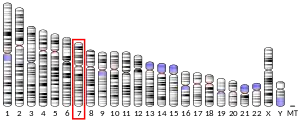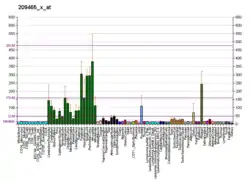Pleiotrophin
Pleiotrophin (PTN) also known as heparin-binding brain mitogen (HBBM) or heparin-binding growth factor 8 (HBGF-8) or neurite growth-promoting factor 1 (NEGF1) or heparin affinity regulatory peptide (HARP) or heparin binding growth associated molecule (HB-GAM) is a protein that in humans is encoded by the PTN gene.[5] Pleiotrophin is an 18-kDa growth factor that has a high affinity for heparin. It is structurally related to midkine and retinoic acid induced heparin-binding protein.
Function
Pleiotrophin was initially recognized as a neurite outgrowth-promoting factor present in rat brain around birth[6] and as a mitogen toward fibroblasts isolated from bovine uterus tissue.[7] Together with midkine these growth-factors constitute a family of (developmentally regulated) secreted heparin-binding proteins[8] now known as the neurite growth-promoting factor (NEGF) family. During embryonic and early postnatal development, pleiotrophin is expressed in the central and peripheral nervous system and also in several non-neural tissues, notably lung, kidney, gut and bone.[9] Pleiotrophin is also expressed by several tumor cells and is thought to be involved in tumor angiogenesis.[10] In the adult central nervous system, pleiotrophin is expressed in an activity-dependent manner in the hippocampus[11][12] where it can suppress long term potentiation induction.[13] Pleiotrophin expression is low in other areas of the adult brain, but it can be induced by ischemic insults.[14][15] or targeted neuronal damaged in the entorhinal cortex or in the substantia nigra pars compacta.
Clinical significance
Pleiotrophin binds to cell-surface nucleolin as a low affinity receptor. This binding can inhibit HIV infection.[16]
References
- GRCh38: Ensembl release 89: ENSG00000105894 - Ensembl, May 2017
- GRCm38: Ensembl release 89: ENSMUSG00000029838 - Ensembl, May 2017
- "Human PubMed Reference:". National Center for Biotechnology Information, U.S. National Library of Medicine.
- "Mouse PubMed Reference:". National Center for Biotechnology Information, U.S. National Library of Medicine.
- "Entrez Gene: PTN pleiotrophin (heparin binding growth factor 8, neurite growth-promoting factor 1)".
- Rauvala H, Pihlaskari R (1987). "Isolation and some characteristics of an adhesive factor of brain that enhances neurite outgrowth in central neurons". J. Biol. Chem. 262 (34): 16625–35. PMID 3680268.
- Li YS, Milner PG, Chauhan AK, Watson MA, Hoffman RM, Kodner CM, Milbrandt J, Deuel TF (1990). "Cloning and expression of a developmentally regulated protein that induces mitogenic and neurite outgrowth activity". Science. 250 (4988): 1690–4. doi:10.1126/science.2270483. PMID 2270483.
- Laaroubi K, Vacherot F, Delbé J, Caruelle D, Barritault D, Courty J (1995). "Biochemical and mitogenic properties of the heparin-binding growth factor HARP". Prog. Growth Factor Res. 6 (1): 25–34. doi:10.1016/0955-2235(95)00002-X. PMID 8714367.
- Vanderwinden JM, Mailleux P, Schiffmann SN, Vanderhaeghen JJ (1992). "Cellular distribution of the new growth factor pleiotrophin (HB-GAM) mRNA in developing and adult rat tissues". Anat. Embryol. 186 (4): 387–406. doi:10.1007/BF00185989. PMID 1416088. S2CID 23579980.
- Kadomatsu K, Muramatsu T (2004). "Midkine and pleiotrophin in neural development and cancer". Cancer Lett. 204 (2): 127–43. doi:10.1016/S0304-3835(03)00450-6. PMID 15013213.
- Wanaka A, Carroll SL, Milbrandt J (1993). "Developmentally regulated expression of pleiotrophin, a novel heparin binding growth factor, in the nervous system of the rat". Brain Res. Dev. Brain Res. 72 (1): 133–44. doi:10.1016/0165-3806(93)90166-8. PMID 8453763.
- Lauri SE, Taira T, Kaila K, Rauvala H (1996). "Activity-induced enhancement of HB-GAM expression in rat hippocampal slices". NeuroReport. 7 (10): 1670–4. doi:10.1097/00001756-199607080-00029. PMID 8904779.
- Pavlov I, Võikar V, Kaksonen M, Lauri SE, Hienola A, Taira T, Rauvala H (2002). "Role of heparin-binding growth-associated molecule (HB-GAM) in hippocampal LTP and spatial learning revealed by studies on overexpressing and knockout mice". Mol. Cell. Neurosci. 20 (2): 330–42. doi:10.1006/mcne.2002.1104. PMID 12093164. S2CID 24655036.
- Takeda A, Onodera H, Sugimoto A, Itoyama Y, Kogure K, Rauvala H, Shibahara S (1995). "Induction of heparin-binding growth-associated molecule expression in reactive astrocytes following hippocampal neuronal injury". Neuroscience. 68 (1): 57–64. doi:10.1016/0306-4522(95)00110-5. PMID 7477935. S2CID 32945854.
- Yeh HJ, He YY, Xu J, Hsu CY, Deuel TF (1998). "Upregulation of pleiotrophin gene expression in developing microvasculature, macrophages, and astrocytes after acute ischemic brain injury". J. Neurosci. 18 (10): 3699–707. doi:10.1523/JNEUROSCI.18-10-03699.1998. PMC 6793139. PMID 9570800.
- Said EA, Courty J, Svab J, Delbé J, Krust B, Hovanessian AG (September 2005). "Pleiotrophin inhibits HIV infection by binding the cell surface-expressed nucleolin". FEBS J. 272 (18): 4646–59. doi:10.1111/j.1742-4658.2005.04870.x. PMID 16156786. S2CID 21153881.
Further reading
- Milner PG, Shah D, Veile R, et al. (1993). "Cloning, nucleotide sequence, and chromosome localization of the human pleiotrophin gene". Biochemistry. 31 (48): 12023–8. doi:10.1021/bi00163a009. PMID 1457401.
- Li YS, Hoffman RM, Le Beau MM, et al. (1993). "Characterization of the human pleiotrophin gene. Promoter region and chromosomal localization". J. Biol. Chem. 267 (36): 26011–6. PMID 1464612.
- Tezuka K, Takeshita S, Hakeda Y, et al. (1991). "Isolation of mouse and human cDNA clones encoding a protein expressed specifically in osteoblasts and brain tissues". Biochem. Biophys. Res. Commun. 173 (1): 246–51. doi:10.1016/S0006-291X(05)81048-4. PMID 1701634.
- Wellstein A, Fang WJ, Khatri A, et al. (1992). "A heparin-binding growth factor secreted from breast cancer cells homologous to a developmentally regulated cytokine". J. Biol. Chem. 267 (4): 2582–7. PMID 1733956.
- Kretschmer PJ, Fairhurst JL, Decker MM, et al. (1992). "Cloning, characterization and developmental regulation of two members of a novel human gene family of neurite outgrowth-promoting proteins". Growth Factors. 5 (2): 99–114. doi:10.3109/08977199109000275. PMID 1768439.
- Li YS, Milner PG, Chauhan AK, et al. (1991). "Cloning and expression of a developmentally regulated protein that induces mitogenic and neurite outgrowth activity". Science. 250 (4988): 1690–4. doi:10.1126/science.2270483. PMID 2270483.
- Huber D, Gautschi-Sova P, Böhlen P (1990). "Amino-terminal sequences of a novel heparin-binding protein from human, bovine, rat, and chick brain: high interspecies homology". Neurochem. Res. 15 (4): 435–9. doi:10.1007/BF00969930. PMID 2388713. S2CID 24896178.
- Asundi VK, Carey DJ (1995). "Self-association of N-syndecan (syndecan-3) core protein is mediated by a novel structural motif in the transmembrane domain and ectodomain flanking region". J. Biol. Chem. 270 (44): 26404–10. doi:10.1074/jbc.270.44.26404. PMID 7592855.
- Raulo E, Chernousov MA, Carey DJ, et al. (1994). "Isolation of a neuronal cell surface receptor of heparin binding growth-associated molecule (HB-GAM). Identification as N-syndecan (syndecan-3)". J. Biol. Chem. 269 (17): 12999–3004. PMID 8175719.
- Fabri L, Maruta H, Muramatsu H, et al. (1993). "Structural characterisation of native and recombinant forms of the neurotrophic cytokine MK". J. Chromatogr. 646 (1): 213–25. doi:10.1016/S0021-9673(99)87023-X. PMID 8408430.
- Kretschmer PJ, Fairhurst JL, Hulmes JD, et al. (1993). "Genomic organization of the human HBNF gene and characterization of an HBNF variant protein as a splice mutant". Biochem. Biophys. Res. Commun. 192 (2): 420–9. doi:10.1006/bbrc.1993.1432. PMID 8484754.
- Hulmes JD, Seddon AP, Decker MM, Böhlen P (1993). "Comparison of the disulfide bond arrangements of human recombinant and bovine brain heparin binding neurite-promoting factors". Biochem. Biophys. Res. Commun. 192 (2): 738–46. doi:10.1006/bbrc.1993.1476. PMID 8484780.
- Kinnunen T, Raulo E, Nolo R, et al. (1996). "Neurite outgrowth in brain neurons induced by heparin-binding growth-associated molecule (HB-GAM) depends on the specific interaction of HB-GAM with heparan sulfate at the cell surface". J. Biol. Chem. 271 (4): 2243–8. doi:10.1074/jbc.271.4.2243. PMID 8567685.
- Bonaldo MF, Lennon G, Soares MB (1997). "Normalization and subtraction: two approaches to facilitate gene discovery". Genome Res. 6 (9): 791–806. doi:10.1101/gr.6.9.791. PMID 8889548.
- Masuda H, Tsujimura A, Yoshioka M, et al. (1997). "Bone mass loss due to estrogen deficiency is compensated in transgenic mice overexpressing human osteoblast stimulating factor-1". Biochem. Biophys. Res. Commun. 238 (2): 528–33. doi:10.1006/bbrc.1997.7188. PMID 9299545.
- Milev P, Chiba A, Häring M, et al. (1998). "High affinity binding and overlapping localization of neurocan and phosphacan/protein-tyrosine phosphatase-zeta/beta with tenascin-R, amphoterin, and the heparin-binding growth-associated molecule". J. Biol. Chem. 273 (12): 6998–7005. doi:10.1074/jbc.273.12.6998. PMID 9507007.
- Fages C, Kaksonen M, Kinnunen T, et al. (1998). "Regulation of mRNA localization by transmembrane signalling: local interaction of HB-GAM (heparin-binding growth-associated molecule) with the cell surface localizes beta-actin mRNA". J. Cell Sci. 111 (20): 3073–80. PMID 9739080.
- Zhang N, Zhong R, Deuel TF (1999). "Domain structure of pleiotrophin required for transformation". J. Biol. Chem. 274 (19): 12959–62. doi:10.1074/jbc.274.19.12959. PMID 10224041.
- Bernard-Pierrot I, Héroult M, Lemaître G, et al. (2000). "Glycosaminoglycans promote HARP/PTN dimerization". Biochem. Biophys. Res. Commun. 266 (2): 437–42. doi:10.1006/bbrc.1999.1835. PMID 10600521.
- Meng K, Rodriguez-Peña A, Dimitrov T, et al. (2000). "Pleiotrophin signals increased tyrosine phosphorylation of beta beta-catenin through inactivation of the intrinsic catalytic activity of the receptor-type protein tyrosine phosphatase beta/zeta". Proc. Natl. Acad. Sci. U.S.A. 97 (6): 2603–8. doi:10.1073/pnas.020487997. PMC 15975. PMID 10706604.
- Murasugi A, Kido I, Kumai H, Asami Y (2003). "Efficient production of recombinant human pleio-trophin in yeast, Pichia pastoris". Biosci. Biotechnol. Biochem. 67 (10): 2288–90. doi:10.1271/bbb.67.2288. PMID 14586125.






